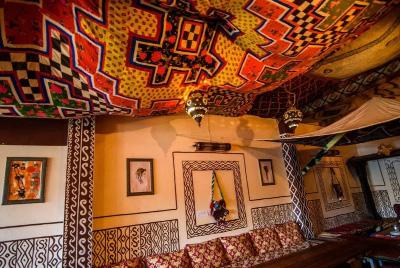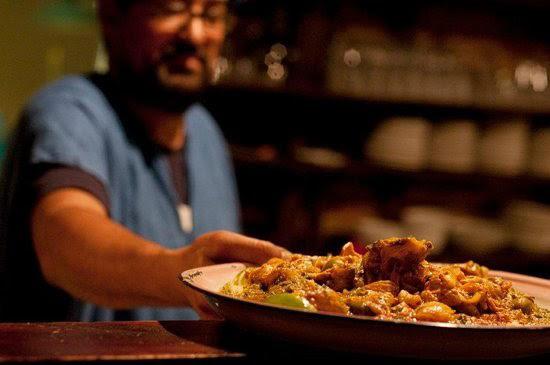
5 minute read
La Khaima
By Deisha Paliwal
At 9pm on an otherwise ordinary Wednesday in March, I had a phone call like no other. I cannot say the day was good or bad; I didn’t strike oil, but I wasn't drilling for it either. Simply put, Wednesday was just like Tuesday until I picked up my phone to dial Atigh.
Advertisement
Born in a small village in Mauritania, Mohamed Ould Atigh founded La Khaïma Cuisine Nomade in the early 2000s. The restaurant is the only Mauritanian one outside the country.
"I grew up as a nomad in the middle of the desert in West Africa looking for food for my camel," Atigh said.
Atigh came to Canada in his 20s to study computer design at l'Université de Montréal. The idea behind La Khaïma came to him in his dorm room, almost by accident, and he didn't stay for long once it did.
"At the time, I didn't have much money, and the food in residence was expensive. I started to cook for myself with spices I had from home. The smell would travel to others’ rooms, and they started giving me $5 here and $10 there for a plate. From there, I got the idea to open a restaurant," Atigh said. "Computer design wasn't for me. It took a few months, but I decided to escape from school. I needed things to move."
Atigh, intent on making things move, packed up and left his residence. He rented a garage on Parc Avenue, which became the restaurant's first brick-and-mortar location.
"From the start, I wanted to make a place where people could gather. I found a place that was 12 feet by 8 feet. There were two tables and four chairs. It worked quite well; it was always busy, since we only had those four chairs," he joked.
It was never about the money for Atigh, and it still isn't.
"I didn't make much at first, but I made people happy. Our day-to-day lives can be so hard that we sometimes forget we are human first. I wanted to remind people of that to give them the feeling of a simple life with the Nomad spirit, " Atigh said.
In the restaurant's early years, Atigh would cook one pot of food for dinner for his neighbours. Source: trip advisor
with others, or share stories. "
Today, La Khaïma is nestled on Fairmount Street in the city's MileEnd, where culture abounds and art flourishes. The restaurant squares comfortably there, but it also stands out.
"When you first walk in, you are shocked. You look up at a ceiling dressed in tapestries, and you breathe in the fragrances from the kitchen. You think that you boarded a plane and landed in Africa or India or somewhere. After that, you see some old red chairs left over from
"I used to cook one dish a night, and I would invite people in the neighbourhood to come and share that meal with their people, " Atigh said. "It's something big I am missing right now with the pandemic not being able to eat with others, laugh

Source: yellowpages Flamenco bars from the 50s. Then, you see me: a guy who doesn't really speak English or French well with long hair and funky clothes. From there, I'll have to ask you big questions that you don't know the answers to, " Atigh said.
On top of the restaurant, in 2009, Atigh launched the La Khaïma Foundation. The foundation strives for the development of nomadic communities in Mauritania through sustainable development initiatives, all while consulting ancestral knowledge. In 2013, together with engineers, anthropologists, and nomads, the foundation installed a drip irrigation system in the agro pastoral village of Ividjaren. They also met with the head of the European Union delegation in the country to articulate the unique needs of nomad peoples, which often went unheard. The following year, the foundation refurbished an old well and installed low-cost solar panels across many towns.
"In my life, I hope to help as many people as I can. Some, I will help get food. Others, I will help to get an education. Other times, it's comforts or music. I just want to see the people around me happy, " Atigh said.
Hibiscus flowers and organic cane sugar come together in a traditional recipe Atigh adopted from his family. For centuries, no-
mads have been cultivating the hibiscus flower, known for its tart flavour and vibrant colour. Each sip of Atigh's hibiscus offers a moment of unparalleled freshness, and each bottle purchased helps to sustain nomadic agriculture in Mauritania. By purchasing the flowers from local cultivators in the Ividjaren region, the foundation aims to reconcile development and dignity through fair trade. Atigh also founded the Nomad Fest in 2009, which has brought together Mauritanian and Canadian artists in a cultural caravan in the Sahara every year since.
"At the beginning, it was an absolutely crazy idea. Now, it's happening," he said.
Described as 'the legacy of ancient times ' by Al Jazeera, the festival has also featured horse parades, traditional Mauritanian stick dances, and Indigenous gastronomy, " You can dance, chant, and celebrate for one week. No one can tell you to turn down the music," Atigh said.
I asked Atigh if there was anything else he wanted to add, though it seemed like he had said it all. Most would say a quick 'that’s all', hang up, and head to sleep after a long day at work, but Atigh is not like most. "If I could tell everyone anyone one thing, it would be this: look for meaning in your life. If you don't see it at first glance, keep looking, or better yet make it yourself. Don't just copy and paste forever. Make your life as you make it; build it as you build it; design it as you design it," he said.
Anyone who knows him will tell you the same: a conversation with Atigh is a pick-me-up in its purest form. It doesn't matter whether you have been his customer for years, or, like me that night, you've never spoken to him before. Once you get to talking, Atigh is your childhood friend. You have always known him, and you always will. The next morning, I woke up determined to make that Thursday in March a little less ordinary than the day before. ♦






